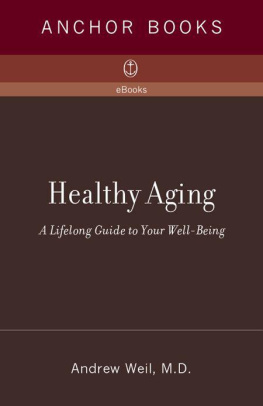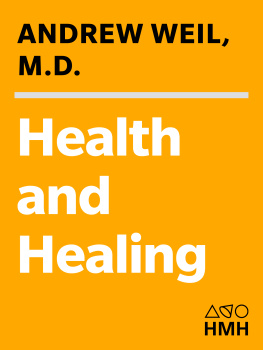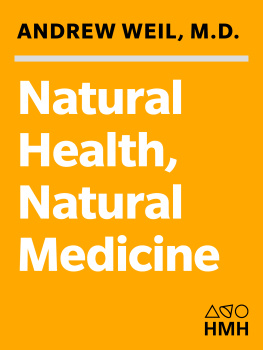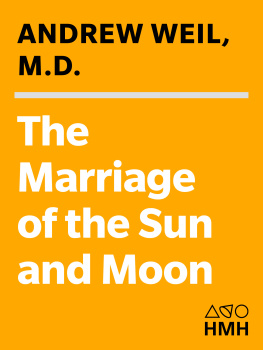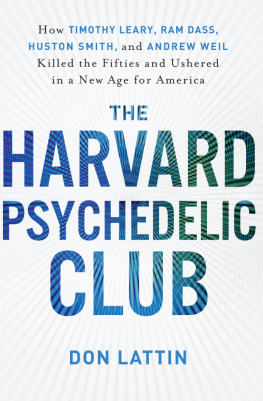Andrew Weil M.D. - Healthy Aging: A Lifelong Guide to Your Well-Being
Here you can read online Andrew Weil M.D. - Healthy Aging: A Lifelong Guide to Your Well-Being full text of the book (entire story) in english for free. Download pdf and epub, get meaning, cover and reviews about this ebook. year: 2007, publisher: Anchor, genre: Romance novel. Description of the work, (preface) as well as reviews are available. Best literature library LitArk.com created for fans of good reading and offers a wide selection of genres:
Romance novel
Science fiction
Adventure
Detective
Science
History
Home and family
Prose
Art
Politics
Computer
Non-fiction
Religion
Business
Children
Humor
Choose a favorite category and find really read worthwhile books. Enjoy immersion in the world of imagination, feel the emotions of the characters or learn something new for yourself, make an fascinating discovery.
- Book:Healthy Aging: A Lifelong Guide to Your Well-Being
- Author:
- Publisher:Anchor
- Genre:
- Year:2007
- Rating:4 / 5
- Favourites:Add to favourites
- Your mark:
- 80
- 1
- 2
- 3
- 4
- 5
Healthy Aging: A Lifelong Guide to Your Well-Being: summary, description and annotation
We offer to read an annotation, description, summary or preface (depends on what the author of the book "Healthy Aging: A Lifelong Guide to Your Well-Being" wrote himself). If you haven't found the necessary information about the book — write in the comments, we will try to find it.
Healthy Aging: A Lifelong Guide to Your Well-Being — read online for free the complete book (whole text) full work
Below is the text of the book, divided by pages. System saving the place of the last page read, allows you to conveniently read the book "Healthy Aging: A Lifelong Guide to Your Well-Being" online for free, without having to search again every time where you left off. Put a bookmark, and you can go to the page where you finished reading at any time.
Font size:
Interval:
Bookmark:
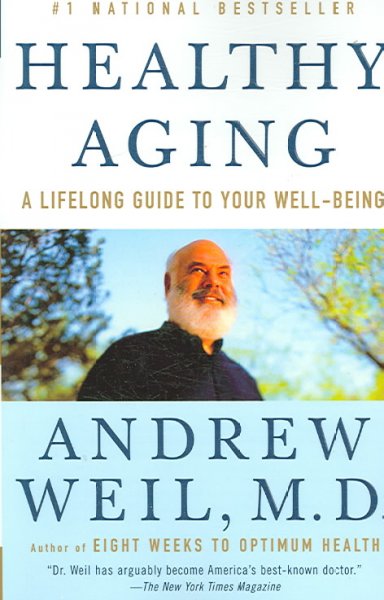
Healthy Aging
Andrew Weil, M.D., has devoted the past thirty years to developing, practicing, and teaching others about the principles of integrative medicine. Dr. Weil combines a Harvard education and a lifetime of practicing natural and preventive medicine to provide a unique approach to health care, which encompasses body, mind, and spirit.
He is the Founder and Director of the Program in Integrative Medicine (PIM) at the College of Medicine, University of Arizona, where he is also a Clinical Professor of Medicine and Professor of Public Health and the Lovell-Jones Professor of Integrative Rheumatology. Dr. Weil received both his medical degree and his undergraduate degree in biology (botany) from Harvard University.
PIM, established in 1994, trains physicians, medical students, nurse practitioners, pharmacists, and allied health professionals on the philosophy and practice of integrative medicine. The program's overriding mission is to lead the transformation of medicine and health care throughout the world by creating, educating, and actively supporting a community of professionals who embody the philosophy and practice of integrative medicine.
A world-renowned leader and pioneer in the field of integrative medicine, Dr. Weil is a bestselling author and editorial director of DrWeil.com, the leading online resource for healthy living based on the philosophy of integrative medicine. Dr. Weil's books include the international bestsellers Spontaneous Healing, Eight Weeks to Optimum Health, Eating Well for Optimum Health, and The Healthy Kitchen. He also authors the popular Self Healing newsletter and is the Director of Integrative Health & Healing at Miraval Life in Balance Resort. Dr. Weil is an internationally recognized expert on integrative medicine, medicinal plants, mind-body interactions, and the future of medicine and health care. More of his work on aging can be found at www.healthyaging.com. He lives in Arizona.
The Healthy Kitchen: Recipes for a Better Body, Life, and Spirit
(with Rosie Daley)
Eating Well for Optimum Health: The Essential Guide to Food,
Diet, and Nutrition
Eight Weeks to Optimum Health: A Proven Program for Taking Advantage of Your Body's
Natural Healing Power
Spontaneous Healing: How to Discover and Enhance Your Body's
Natural Ability to Maintain and Heal Itself
Natural Health, Natural Medicine: The Complete Guide to
Wellness and Self-Care for Optimum Health
Health and Healing: The Philosophy of Integrative Medicine
From Chocolate to Morphine: Everything You Need to Know
About Mind-Altering Drugs
(with Winifred Rosen)
The Marriage of the Sun and Moon: Dispatches from the
Frontiers of Consciousness
The Natural Mind: A Revolutionary Approach to the Drug Problem

PART ONE
PART TWO
In 2002, I turned sixty. To help celebrate the occasion, friends organized a surprise party for me. After the festivities, there came a time to reflect, and when I did I came to an uncomfortable conclusion: I am closer to a time when my energy and powers will diminish, when I will lose my independence. Sixty is about the time that organs of the body begin gradually to fail, when the first hints of age-related disease begin to appear.
I hardly notice my aging on a day-to-day basis. When I look in the mirror in the morning, my face and white beard seem the same as the day before. But in photographs of myself from the 1970 s, my beard is completely black. Looking at old photographs, I can't help but notice the physical change that has taken place in the course of thirty years. If I pay attention, I can notice other changes in my body: more aches and pains, less resilience in meeting the challenges of traveling, less vigor on occasion. And my memory may not be quite what it used to be. At the same time, despite the evidence, some part of me feels unchanged, in fact feels the same as when I was six. Almost everyone I talk to about aging reports similar experiences.
Some years ago I went to my twenty-fifth high school reunion, the only school reunion I have ever attended. I had not seen most of my classmates since our graduation in 1959. A few of them were just as I remembered them, hardly changed at all, closely matching the images in my memory from a quarter century earlier. Others looked so aged that I could barely find points of coincidence with the pictures of them I had in my head. Why the difference? Why are some individuals so outwardly altered by time and others not? Or, in other words, why is there often a discrepancy between chronological age and biological age? I believe that the answer has to do with complex interactions of genetics and environment. I also believe, based on evidence I have reviewed, that we have control over some of those factors.
I do not subscribe to the view that aging suddenly overtakes us at some point in life, whether at sixty or some other milestone. I meet researchers, physicians, and others who believe that we are born, grow rapidly to maturity, and then coast along on a more or less comfortable plateau until we begin to decline. They call the period of decline senescence and consider it distinct and apart from what came before. If one looks only at the physical aspects of life, especially on the cellular level, this is a plausible view.
Cells from old organisms are different from cells of young ones, and observations about how they differ are the basis of biogerontology, the new science of the biology of aging. It is biogerontologists who promote the idea that aging is a programmed phase of decline following the plateau of maturity. In their view senescence is a discrete phase of cellular life coincident with loss of the cells ability to divide. Senescent cells can still perform many of the functions of life, but they cannot reproduce. When researchers attempt to take cells from organisms, whether plants or animals, and grow them in test tubes, senescence soon overtakes the cultures, cells stop dividing, and the cultures die. (In human life, senescence equates with the period of functional decline that precedes death, with the appearance of age-related diseases.)
By contrast, when cells turn malignant, they often become immune to senescence. Cell biologists refer to this change as immortalization. It is one of the most curious and important characteristics of cancer, and I will describe it in more detail later. It points to an equally curious and important possibility about aging, namely, that the mechanics of aging in cells may have evolved as defenses against cancer. Malignant growth may be immortal at the cellular level, but it has the potential to disable and kill entire organisms prematurelythat is, before they can pass on their genes and contribute to the survival and evolution of the species. For life to continue, prevention of malignant growth must be a priority.
In any case, I find it more useful to think of aging as a continuous and necessary process of change that begins with conception. In the words of an Eastern philosopher:
The sun at noon is the sun declining;
The person born is the person dying.
Wherever you are on the continuum of aging, it is important to learn about how to live in appropriate ways in order to maximize health and happiness. That should be an essential goal for all of us. What is appropriate when you are in your twenties is likely not to be appropriate when you are in your fifties.
Font size:
Interval:
Bookmark:
Similar books «Healthy Aging: A Lifelong Guide to Your Well-Being»
Look at similar books to Healthy Aging: A Lifelong Guide to Your Well-Being. We have selected literature similar in name and meaning in the hope of providing readers with more options to find new, interesting, not yet read works.
Discussion, reviews of the book Healthy Aging: A Lifelong Guide to Your Well-Being and just readers' own opinions. Leave your comments, write what you think about the work, its meaning or the main characters. Specify what exactly you liked and what you didn't like, and why you think so.

